Finding the right project manager, who has the skill sets, experience and proper corporate cultural fit for your organization is not as easy as just posting a job listing. You need to meet the potential candidate and figure out if they’re suited for the job. That’s where having the right project manager interview questions comes in.
Project management interview questions will guide your decision-making process. Hire a leader with the project management and communication skills that’ll lead your projects to success by using these project manager interview questions.
Related: Free Project Management Templates and Spreadsheets for Excel
Types of Project Manager Interview Questions
There are two main types of project management interview questions, behavioral and scenario-based questions. These two approaches help interviewers get as much information as possible from project managers.
Scenario-Based Project Manager Interview Questions
The purpose of scenario-based interview questions is to ask project manager candidates how they’d respond to hypothetical project management scenarios. Here, you can understand the thinking process of your project managers and look into their problem-solving skills, leadership style, knowledge of project management methods and tools, etc.
Behavioral Project Manager Interview Questions
This type of interview question asks for events that happened in the past. The purpose of these project manager interview questions is to get an idea of how the project manager has acted in the past, and how he or she applied applicable project management skills and knowledge to solve real-life problems.
The 30 project management interview questions below include these two types of questions. We hope they help you prepare for your PM interview.
Types of Project Manager Interviews
Most employers typically conduct several rounds of interviews to look at project managers through different lenses. This is done to get a better understanding of the technical capabilities of project managers, their past performance and their decision-making under different scenarios.
Here’s some expert advice from Devin Deen, certified scrum master and project manager expert. In the video below he explains some the main types of project manager interviews that you’ll need to go through to get a project management role.
Top Project Manager Interview Questions and Answers
Here are some of the most common project manager interview questions that will help you find the best talent for your projects. They’re also helpful if you want to learn how to prepare for a project manager interview. There are different types of PM interview questions as well as some icebreakers to start the interview.
1. Tell me about yourself
This is a typical question for an interview and is a great way to break the ice and conversate. But you can get important information about the candidate’s past experiences, skills and education. You can also get a feel of how well this individual will adapt to the project manager role at your organization. A good way to do this is to ask the candidate to tell you a little about his or her past, present and future project management job expectations.
How to answer: Be honest in answering this and every question, but keep it brief. You can share relevant information about your upbringing. For example, was one of your parents a project manager? What in your upbringing shows you have the leadership or communication skills to manage a team and handle the pressure of a project? If you have project management certification or prior positions that make you the ideal candidate, make sure to bring that up.
2. What’s your background, personally and professionally?
It’s important to get a snapshot of the applicant to bring their project manager resume into sharper focus. Knowing a bit about their life story unveils their soft skills and how they might respond to issues at work, and whether they’ll fit into the corporate culture.
How to answer: If you haven’t brought up your profession and educational background in the previous question, now’s the time to do so. It’s also good to bring up a personal anecdote that illustrates your leadership qualities. The same goes for their project management experience. Staying at a single job for a long time can be either bad or good for project managers, but you won’t know until you put their choice into context.
3. What’s your ideal project?
The ideal project is the one that you’re hiring for, of course! But on a serious note, try to get them to answer honestly. It’ll let you know what sort of projects they prefer to work on which gives a better feel for what kind of project management methodology excites them. This can help you place the project manager with the right project, or help them adapt to the project team you’re hiring them to manage.
How to answer: Be specific in answering this question. It’s best if you can relate a past project you worked on and why it checked all the boxes for you. If, for example, you’re applying to a construction company, then you’ll want to share a previous construction project that excited you, perhaps because of the length and complexity of the project. The more specific and passionate you are in your answer, the better you can show your enthusiasm for the work.
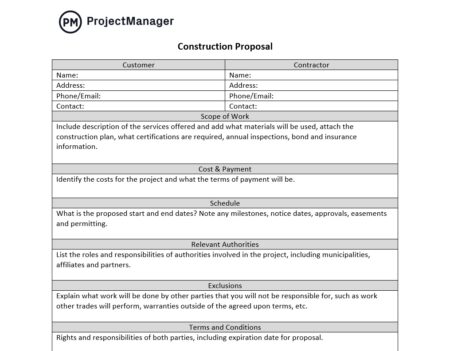
4. Have you worked in this industry before?
Does the candidate have project management experience in your industry? That’s important because they might excel at the project management methods your company uses or may have the right risk management skills to manage your projects. If they don’t, it’s not a deal breaker as much of project management is the same from industry to industry.
How to answer: If you’ve worked as a project manager, share that experience, such as how the prevalent projects panned out. But if you haven’t held a project manager position in the past yet and have strong project management skills or certifications that relate to the industry of your potential new employer, that can make up for a lack of direct experience. Whether you do or don’t have experience, be confident as it shows you’re an authentic person who’s comfortable in the position.

Get your free
PM Interview Questions
Use this free PM Interview Questions for Word to manage your projects better.
5. What are some key challenges for our industry and how would you overcome them?
The interviewer is testing your knowledge about the project management industry. You must be not only well-versed in methodologies, techniques and tools used to manage projects, but in the larger picture.
How to answer: Use personal experience and effective solutions that you used. But also think about the organization that you’re interviewing with and the challenges they’re facing in the industry. This will show your understanding of the industry, the market, current challenges and possible solutions that relate specifically to the position you’re applying for.
6. Have you managed remote teams?
Not all projects are executed under one roof and remote teams are common. With more dynamic project management tools and a global workforce to choose from, many project managers might never meet the members of their team, at least in person, but they’ll be able to work together using project management software. Then there are the necessary resources that’ll be outsourced, which involves a different resource management technique than when working with employees. Knowing how they’ve managed people and resources can help you get an overview of their leadership skills and be a crucial point in your decision to hire or not to hire.
How to answer: This has become one of the most popular project manager interview questions as most companies now have an online workforce. Again, honesty is key. Lying will only cause future troubles. If you’ve managed a remote team, talk about the challenges of leading a group of people who you never met face-to-face. How’d you build a cohesive team from a distributed group? How did you track progress, foster collaboration, etc.? If you haven’t managed a remote team, explain how you would or what team management experience you have and how it’d translate to a situation where the team was not working together under one roof.
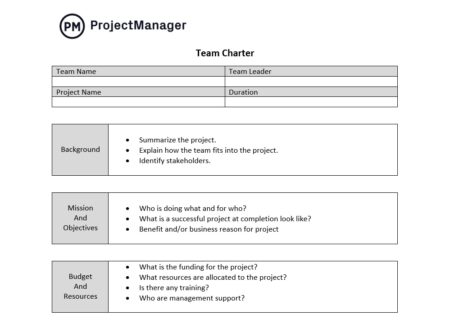
7. How did your last project end?
This question is about discovering any lessons they learned from that project. Everything about project management is a learning experience, and each project offers lessons from which a good project manager grows.
How to answer: Don’t be vague. Answer the question with a specific example. Provide a quick overview of the project’s goals, deliverables, constraints and risks. Show how you dealt with those project issues and brought the project to a successful conclusion. If the project failed, explain why, but don’t lay blame on others. You’re the project manager and the buck stops with you.

8. How do you prioritize tasks on a project?
Task management is important. There’s going to be more work in a day than can be accomplished, so any good project manager is going to have to determine what is crucial and what could be left undone if necessary. It’ll prove interesting and informative to see how the candidate makes these time management and task management decisions.
How to answer: If you can tether your answer to a real-life situation that’s best. Some project manager interview questions like this one don’t require abstract answers, but rather one that comes from the applicant’s experience. Explain how you review all the tasks for a particular project and then the decision-making process in prioritizing. For example, do you use the critical path method or some other technique? That will reveal a lot to the interviewer.
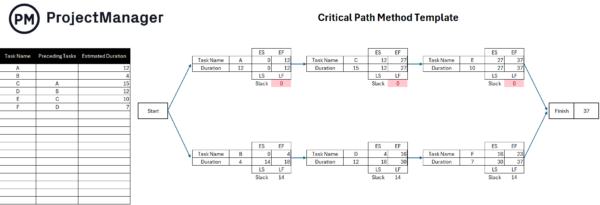
9. How do you foster team collaboration?
This behavioral question is a great way to gauge the candidate’s basic leadership and team management knowledge as well as their ability to use modern work management software and team collaboration apps. Project managers need to use tools to communicate with their team members whether they’re traditional, remote or hybrid teams.
How to answer: This question can be answered in two ways. You’ll want to give examples of how you facilitated collaboration with a team in the past by leading them through team-building exercises. But that just sets the stage for good collaboration. Next, you’ll want to talk about the project management software or other tools you used to connect teams so they could quickly and easily share files, comment on tasks, etc.
10. What was a challenging project, and how did you manage it?
This behavioral question takes the conversation from theoretical to practical. You can see how the project manager responded to real-life problems to help determine how they’d manage projects at your organization. This question also provides a sense of the person’s project management experience, such as how they lead teams and deal with conflicts. By asking about a challenging project, you can see how they apply their hard and soft skills when pushed to their limits and beyond.
How to answer: It’s a bit of a broken record, but the advice is important enough to repeat; be honest. Choose a real project that has challenged you. Set it up by explaining what those challenges were and explain how you addressed and resolved challenges. It’s a bit of a balancing act as you want to make the project’s challenges real, but you also want to show how you dealt with them. Don’t take all the credit, though. Make sure to give credit to your team.
11. What’s the biggest mistake you’ve made on a project?
Everyone makes mistakes; character is defined by how you deal with them. This project management interview question allows you to first gauge the candidate’s honesty.
How to answer: This is another tricky question. If you say that you’ve never made a mistake, you can rest assured that the interviewer won’t believe you’re truthful and your resume will go into the circular file. However, when you share a mistake you’ve made, interviewers will note that you take responsibility for your actions, which reveals your level of maturity. Bonus points if you can show how that mistake was rectified by you and your team.
Interview Questions for Project Managers About Team Management
Projects are a team effort, so any project management interview will likely include questions about how you manage teams. Make sure you highlight team management skills such as leadership, communication skills, conflict resolution and interpersonal skills. The main purpose of these project management interview questions is that interviewers want to understand how well you can work with others, including project teams and stakeholders.
12. How do you ensure that your team is staying up to date with new tools and techniques?
Project managers can’t be complacent. They need to constantly stay updated on the industry and how it works, new technologies and tools can make the difference between a project that succeeds or fails. Through their project manager interview questions, interviewers must assess the applicant’s ability to implement new tools and techniques to manage projects.
13. What’s your leadership style?
Talking about managing a project will inevitably lead to a discussion of leadership style. There are many ways to lead, and all have their pluses and minuses. Depending on the project, a project manager might have to pick and choose how they lead, ranging from a top-down approach to servant leadership. See how well-versed they are in leadership techniques and how they apply them to project management.
14. What’s your communication style?
This is another classic project management interview question that directly stems from asking about managing projects and leadership. A project manager is nothing if he has poor communication skills. They need to be able to speak to team members, stakeholders, vendors, etc. Each group needs a slightly different approach. Stakeholders want the broad strokes of the project management plan, while team members need more detail. If a project manager can’t clearly communicate, the project is doomed before it has begun.
Being a good communicator is only the start. Project management software helps you better target communication with your team and stakeholders. ProjectManager has project management tools like Gantt charts, kanban boards and project calendars to clearly communicate your project plan. Our online software allows you and your team to collaborate in real time. If someone has a question, they can tag another person on the team to get them into the conversation. Our email and in-app notifications make sure you’re never late for a meeting or an important stakeholder presentation. Try our tool for free today.
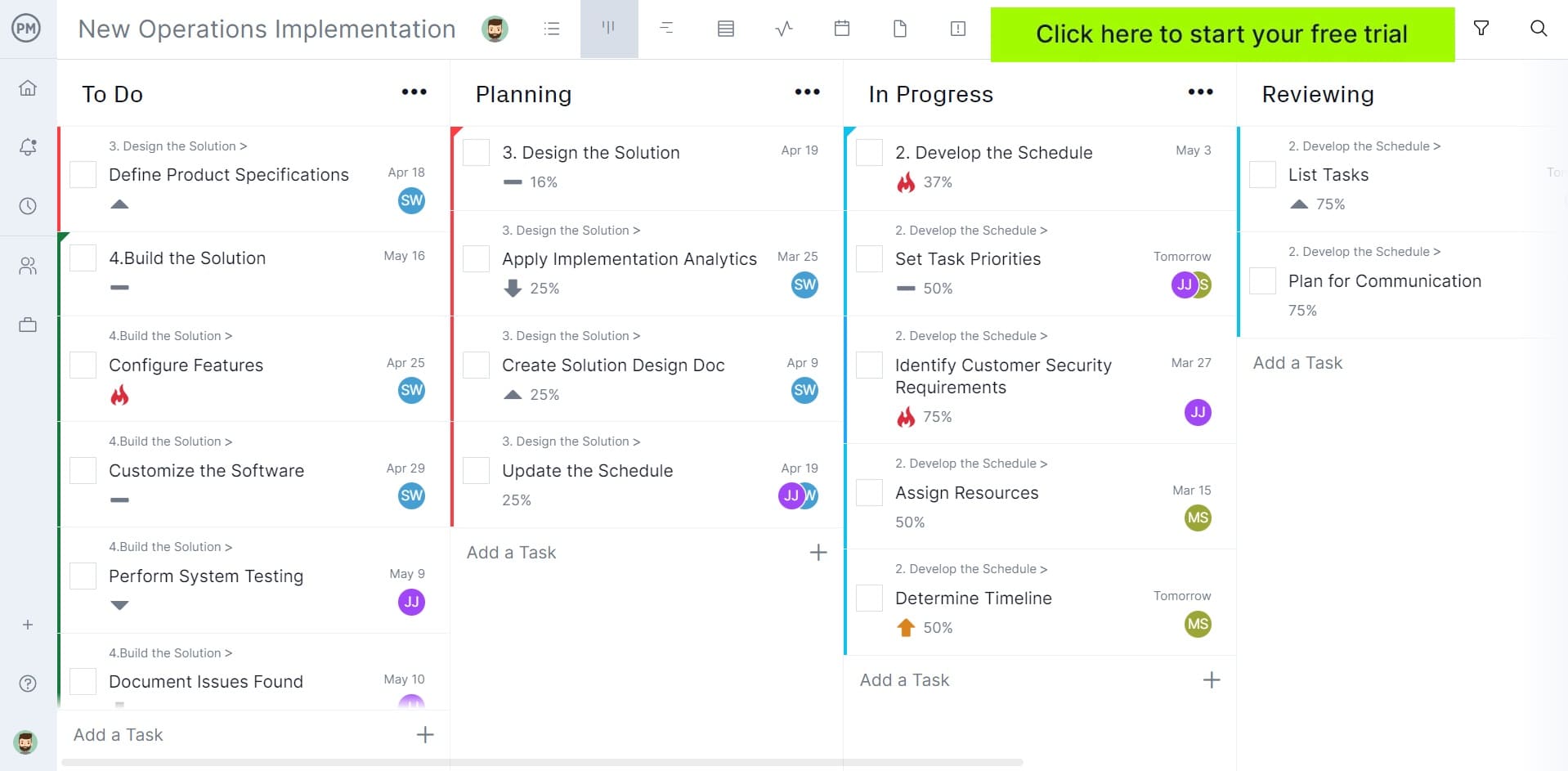
15. What are your career goals for the future?
The interviewer is looking for several things when asking this question. They want to know if your career ambitions fit with what the organization can offer in terms of advancement. They’re also curious if you’re just using this position as a stepping stone to land a better gig elsewhere. Honesty is the best policy when answering this question; don’t lie but you don’t have to be overly specific, either.
16. How do you set goals for your team and how do you track those goals?
Project managers set goals for their teams. It’s a critical part of keeping them motivated and keeping to the schedule, which is why this is a common project manager interview question. But goals without a means to measure them are useless.
17. How do you seek help outside of the project team?
This project manager interview question gives you information about the leadership and communication skills of your project manager candidate. Some project managers are going to think you want a person who’s wholly independent and pulls from an inner reservoir. But more resourceful is the project manager who knows when they’re over their head and asks for help from a mentor or a network of professionals.
18. How do you gain agreement with teams?
Where there are people, there are conflicts, and even the best projects have problems. Good teams collaborate and trust one another. If there’s a problem between two or more project team members, it must be resolved quickly. But this can also apply to stakeholders, vendors, etc. A project manager is a bit of a psychologist who must know how to resolve conflicts quickly.
19. Do you delegate?
The last thing you want is a project manager who carries everything on their shoulders. But this is a bit of a trick question or at least one that has an implicit question embedded in it. What you really want to know is not whether they delegate, but how they delegate work to their team members. This is a great way to weed out the micromanagers.
That doesn’t mean a project manager is absent from the process. Project management software has features to keep them aware of what their team is doing but not in the way. For example, ProjectManager has a board view that visualizes the workflow. The kanban allows managers to oversee their team as they work and make sure things are moving forward. Even better, if a potential block is spotted in the production, the manager can reallocate resources to keep the work moving forward.
20. How do you manage team members that aren’t working to their full potential?
Sometimes, no matter how much due diligence you put into assembling a skilled and experienced project team, someone underperforms or creates conflicts. While the project is rolling, you don’t have time to stop and tweak your team. Rather, the project manager must use problem-solving techniques and communication skills to deal with the problem. This comes up with even the best project team, so any capable project manager would know how to nip underperformance in the bud.
Interview Questions for Project Managers About Work Experience
Work experience is always important in any type of interview, and that’s true for project management interviews. Employers make these project manager interview questions because they need to make sure you have the necessary hands-on experience that’s required to be a good fit for their type of projects and that you have the capabilities to excel in their industry.
21. What steps do you take for efficient risk planning?
Managing risk is important, whether those risks are positive or negative to the project’s outcome. Projects rarely go as planned. This project manager interview question is to see if you understand how to identify and resolve risks while maintaining the project schedule and keeping to the budget.
22. How do you deal when you’re overwhelmed or underperforming?
It’s easy to forget that project managers are people, too. They’re hired to perform project management processes and lead a project to success, but they can suffer the same setbacks as anyone on the team throughout the project life cycle. The difference between a good and a great project manager is the ability to monitor oneself and respond proactively to any drop-offs in performance.
23. How do you work with customers, sponsors and stakeholders?
Even project managers have to answer to someone. Responding to executives, project sponsors and stakeholders requires a different approach than the one they’d use with teams and vendors. Part of their duties includes managing stakeholders who hold a position of authority over the project manager. That takes a subtle touch.
24. If the project isn’t adhering to schedule, how do you get it back on track?
Knowing that a project isn’t keeping to its schedule is only as important as being able to get the project back on track. Once a project manager is aware of the discrepancy between the actual project schedule and the schedule baseline estimated in the project plan, they need to take action, such as project crashing or fast-tracking. Any project manager worth hiring will be able to answer this with practical specifics. On these types of questions, it’s best to answer with the STAR method.
25. Do you have budget management experience?
It helps to drill down into specific aspects of the project management experience of your candidates. Naturally, if the candidate has specific skills, they’ll be briefly sketched in the resume. But here’s your opportunity to get a deeper sense of where they stand in terms of their experience with project management processes such as budget management. Project managers are known as planners. They create a project schedule and lead teams to success. But there’s often money involved, so they should know how to handle a project budget.
26. How do you know the project is off track?
Every project hits a snag along the way, but not every project manager is aware of that delay until the project budget or project schedule is affected. The ability to monitor and track the progress of a project and tell immediately when it’s not meeting the benchmarks you set in the project planning phase is perhaps the most important duty of a project manager. It’s also important to see if the project manager candidates have experience implementing a risk management plan to mitigate risks and keep projects on budget and schedule. ProjectManager has project dashboards to help project managers spot issues before they become serious problems.
27. What project management software do you prefer?
A project manager needs project management tools to plan, monitor and report on the project. There are many, from simple to complex. This question reveals first how up-to-date the candidate is regarding software and project management tools. Additionally, it provides a picture of what tools and processes they use to manage a project.
Most project managers heavily rely on Gantt charts when it comes to project planning and scheduling. ProjectManager has award-winning online Gantt charts that allow project managers to plan every phase of their projects. Managers can create dependencies, add milestones, assign tasks, manage workload and more—all from one screen. Any project manager you hire would appreciate the power of our planning tools.
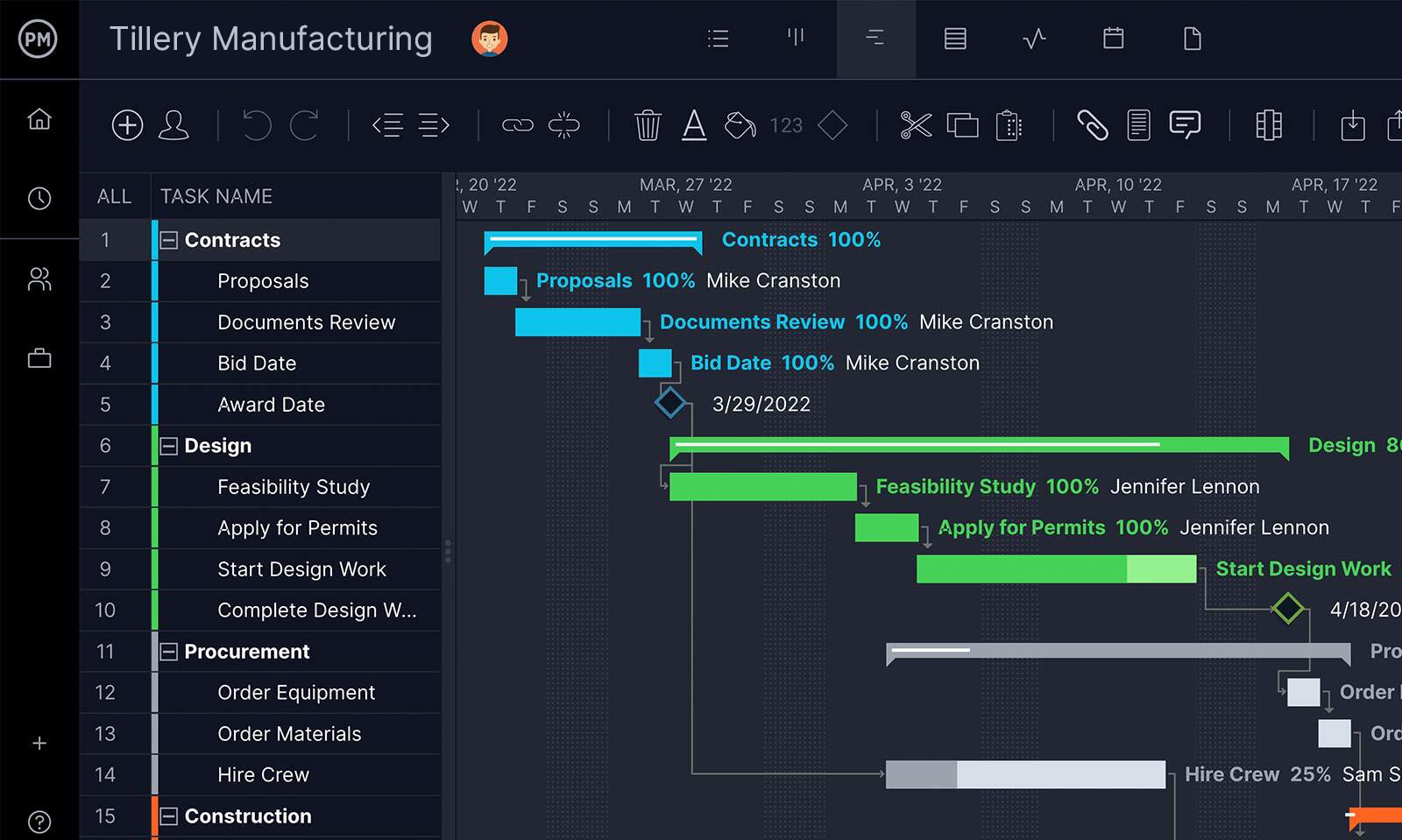
28. What’s your preferred project management methodology?
There are almost as many ways to manage a project as there are projects. From traditional methods like waterfall to hybrid methodologies, you want a project manager who understands the many ways to work. And more importantly, can they use the project management methodology that best suits the work at hand?
Out-of-the-Box Project Manager Interview Questions
Lastly, employers will often ask out-of-the-box questions to relieve the tension of the interview and be able to get a better idea of what the candidate’s personality is like.
29. How tall are the pyramids in Egypt?
Talk about not being prepared. Who’s going into a job interview with this information in their head? You don’t want an accurate answer to this question, but you do want to see how the project manager deals critically and seriously with the question. Because during the project, they’ll be sidelined with unexpected challenges and questions.
30. What’s something you don’t want us to know?
Ouch. Yes, you need to go there and make the candidate uncomfortable. It’s not that you want to learn some secret or catch them in an unethical act. Less important than the content of their answer is the way they deal with the question. You’ll get a better picture of the person instead of the persona they’re presenting. It also shows their communication skills while under pressure. It might seem cruel, but it’ll help you get to the heart of the person that you’re going to trust with the management of your project.
Tips for Preparing for a Project Manager Interview
One tip for preparing for your project manager interview is to get familiar with the above questions to give you a sense of confidence when in the interview. This will go a long way. People want to hire people that they can trust.
Other than that, you should do your homework. Research the organization you’re interviewing at and know their history and what they do. Also, study the job description and make sure you understand what will be expected of you.
If you know who the hiring manager is, you can also do a bit of research on them. You don’t want to come across as a stalker, but it could help you feel more comfortable having a bit of background on the person.
Finally, practice. Ask a friend you trust to be honest with you and ask them to act as the interviewer. They can ask the questions above. It’ll help you get comfortable answering them. Take constructive feedback from your friends and hone your answers and mannerisms to be the best applicant.
How ProjectManager Helps Project Managers
If you’re a project manager or are looking for one, then you have projects to execute. Projects need more than a good project manager to lead them, they need project management tools, too. ProjectManager is online project management software that helps project managers plan, monitor and report on the project, while team members collaborate on tasks online. It’s ideal for the whole organization.
Dashboards to Track Your Projects
Monitoring a project is the only way to make sure your team is aligned with the project plan. Online Gantt charts measure the progress of each task, but project managers want a bird’s-eye view. ProjectManager has a real-time dashboard that tracks six project metrics to help project managers monitor the overall progress of the project. The dashboard also helps project managers keep their stakeholders in the loop.
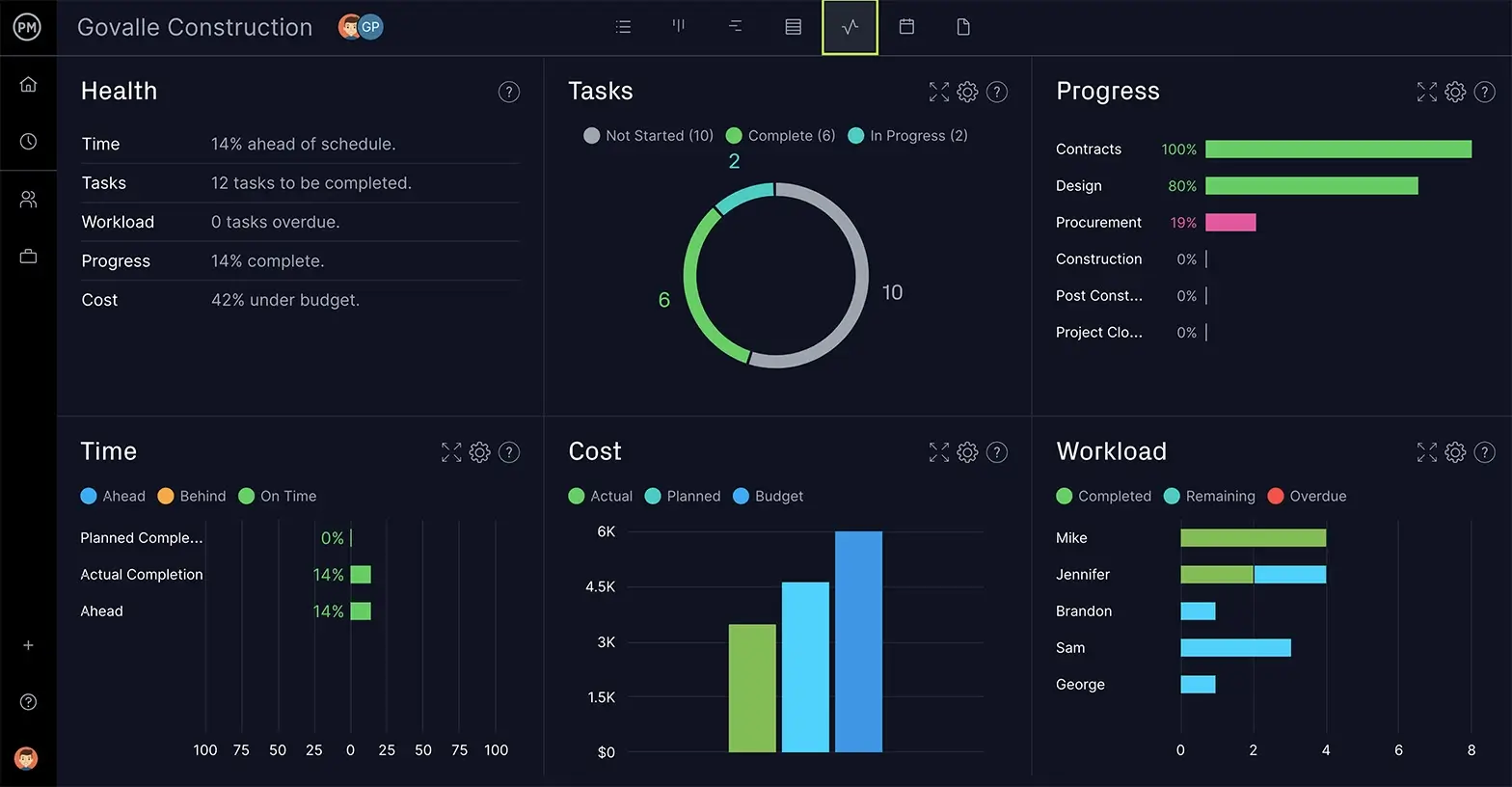
Generate Reports for Stakeholders
Stakeholders usually ask for broad strokes to make sure the project is going well, but sometimes they want more detail. ProjectManager has one-click reports that can be filtered to show just the information stakeholders or project managers need to keep tabs on the progress of the project.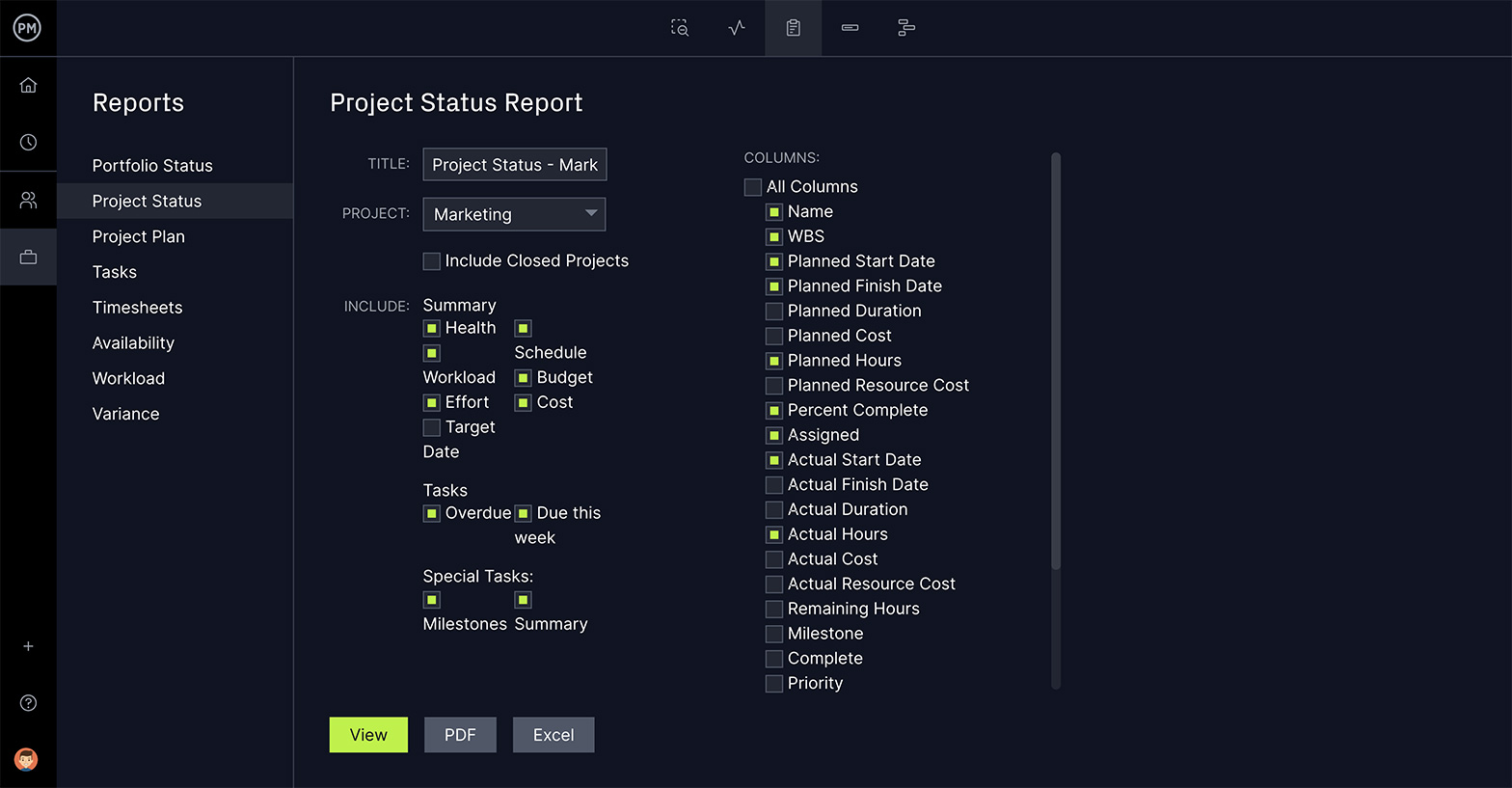
Teams are a project’s most valuable resource. ProjectManager keeps team morale high by giving project managers the tools they need to manage their workload and make sure no one is given too many tasks while others are idle. ProjectManager also streamlines project timesheets and has features that manage project resources, so projects can deliver on stakeholder expectations.
Once you’ve gotten through the project manager interview process and a job offer has been made, then it’s up to you to provide them with the best tools to manage the project. ProjectManager is online project management software with real-time dashboards, online Gantt charts and a collaborative platform for your team. There’s no question, this is what your project manager will want. Try our award-winning software for free with this 30-day trial.


